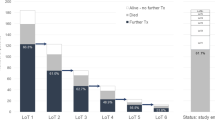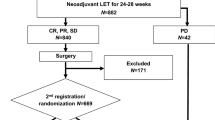Abstract
Purpose
In the management of estrogen receptor-positive, human epidermal growth factor receptor 2-negative metastatic breast cancer (ER+HER2−MBC) patients, endocrine therapy (ET) is preferred to chemotherapy (CT) as a primary systemic therapy (PST) when tumor burden is not high. However, there are no definite criteria for choosing a PST, transitioning from ET to CT or using maintenance ET subsequent to CT.
Methods
We reviewed the medical records of 311 ER+HER2−MBC patients who underwent CT from September 2002 to December 2016 and assessed their outcomes.
Results
Of the 311 patients, 178 (57%) received ET as a PST (ET-first group), and 133 (43%) received CT prior to ET (CT-first group). The ET-first group showed a median overall survival (OS) from the diagnosis of MBC (OSMBC) of 1593 days, and the median OS from the initiation of CT (OSCT) was 938 days. Patients with visceral involvement, liver metastasis, soft tissue metastasis, ≥3 organ involvement, or primary advanced BC at the MBC diagnosis showed a significantly higher tendency to be assigned to the CT-first group (P < 0.01 for any visceral involvement, P < 0.05 for all others). Maintenance ET was available in 74 (55.6%) patients in the CT-first group, who showed a significantly better OSMBC and OSCT than patients without maintenance ET (median OSMBC 1423 and 867 days, respectively, P < 0.0001; median OSCT 1350 and 637 days, respectively, P < 0.0001).
Conclusion
Our findings suggest the possibility for changing the treatment paradigm of patients with ER+HER2−MBC, so a randomized prospective study is warranted to determine the optimum sequence of systemic therapies.



Similar content being viewed by others
References
National Comprehensive Cancer Network (2017) NCCN breast cancer guidelines. Version I 2017. https://www.nccn.org/professionals/physician_gls/pdf/breast.pdf
Cardoso F, Costa A, Senku E et al (2017) 3rd ESO–ESMO international consensus guidelines for advanced breast cancer (ABC 3). Ann Oncol 28:16–33
Murphy CG, Dickler MN (2016) Endocrine resistance in hormone-responsive breast cancer: mechanisms and therapeutic strategies. Endocr Relat Cancer 23:337–352
Baselga J, Campone M, Piccart M et al (2012) Everolimus in postmenopausal hormone-receptor-positive advanced breast cancer. N Engl J Med 366:520–529
Hammond ME, Hayes DF, Dowsett M et al (2010) American Society of Clinical Oncology/College of American Pathologists guideline recommendations for immunohistochemical testing of estrogen and progesterone receptors in breast cancer. J Clin Oncol 28:2784–2795
Lobbezoo DJA, van Kampen RJW, Voogd AC et al (2016) In real life, one-quarter of patients with hormone receptor-positive metastatic breast cancer receive chemotherapy as initial palliative therapy: a study of the Southeast Netherlands Breast Cancer Consortium. Ann Oncol 27:56–262
Bonotto M, Gerratanaa L, Di Maioc M et al (2017) Chemotherapy versus endocrine therapy as first-line treatment in patients with luminal-like HER2-negative metastatic breast cancer: a propensity score analysis. Breast 31:114–120
Andre F, Neven P, Marinsek N et al (2014) Disease management patterns for postmenopausal women in Europe with hormone-receptor-positive, human epidermal growth factor receptor-2 negative advanced breast cancer. Curr Med Res Opin 30:1007–1016
Swallow E, Zhang J, Thomason D et al (2014) Real-world patterns of endocrine therapy for metastatic hormone-receptor-positive (HR+)/human epidermal growth factor receptor-2-negative (HER2−) breast cancer patients in the United States: 2002–2012. Curr Med Res Opin 30:1537–1545
Finn RS, Crown JP, Ettl J et al (2016) Efficacy and safety of palbociclib in combination with letrozole as first-line treatment of ER-positive, HER2-negative, advanced breast cancer: expanded analyses of subgroups from the randomized pivotal trial PALOMA-1/TRIO-18. Breast Cancer Res 28:67
Bonotto M, Gerratana L, Poletto E et al (2014) Measures of outcome in metastatic breast cancer: insights from a real-world scenario. Oncologist 19:608–615
Nanda R, Chow LQ, Dees EC et al (2016) Pembrolizumab in patients with advanced triple-negative breast cancer: Phase Ib KEYNOTE-012 study. J Clin Oncol 34:2460–2467
Kaufman B, Shapira-Frommer R, Schmutzler RK et al (2015) Olaparib monotherapy in patients with advanced cancer and a germline BRCA1/2 mutation. J Clin Oncol 33:244–250
Robson M, Im S-A, Senkus E, Xu B, Domchek SM et al (2017) Olaparib for metastatic breast cancer in patients with a germline BRCA mutation. N Engl J Med. doi:10.1056/NEJMoa1706450
Wilcken N, Hornbuckle J, Ghersi D (2003) Chemotherapy alone versus endocrine therapy alone for metastatic breast cancer. Cochrane Database Syst Rev 1(2):CD002747
Niikura N, Liu J, Hayashi N et al (2011) Treatment outcome and prognostic factors for patients with bone-only metastases of breast cancer: a single-institution retrospective analysis. Oncologist 16:155–164
Gerratana L, Fanotto V, Bonotto M et al (2015) Pattern of metastasis and outcome in patients with breast cancer. Clin Exp Metastasis 32:125–133
Acknowledgements
A part of this article was presented at the poster sessions of the European Society of Medical Oncology (ESMO) 2016 Congress and the 2nd World Congress on Controversies in Breast Cancer (CoBrCa).
Funding
None declared.
Author information
Authors and Affiliations
Corresponding author
Ethics declarations
Conflict of interest
The authors declare that they have no conflict of interest.
Ethical approval
This study was conducted in full compliance of the laws and after obtaining approval from the Institutional Review Board of the Hospital where the study was conducted.
Rights and permissions
About this article
Cite this article
Watanabe, J., Hayashi, T., Tadokoro, Y. et al. Clinical pattern of primary systemic therapy and outcomes of estrogen receptor-positive, HER2-negative metastatic breast cancer: a review of a single institution. Breast Cancer Res Treat 166, 911–917 (2017). https://doi.org/10.1007/s10549-017-4478-z
Received:
Accepted:
Published:
Issue Date:
DOI: https://doi.org/10.1007/s10549-017-4478-z




